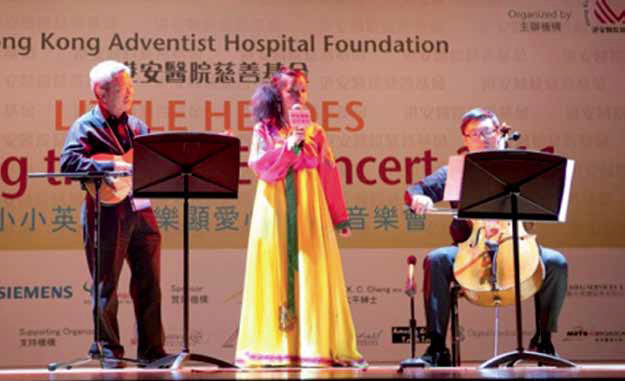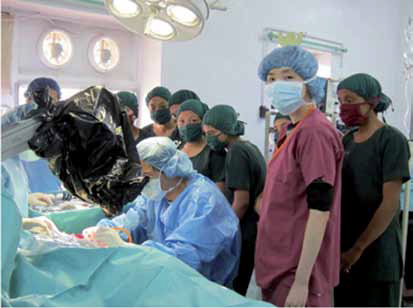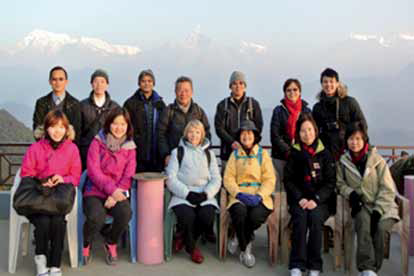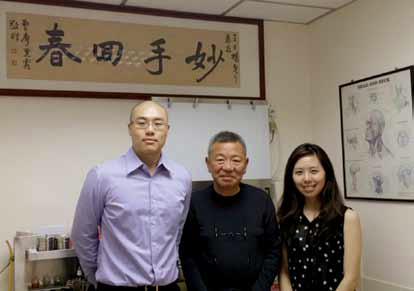© Hong Kong Academy of Medicine. CC BY-NC-ND 4.0
DOCTOR FOR SOCIETY
An interview with Dr Buddy Wong
Wilfred S Wong, Michelle Tam
Graduates from Faculty of Medicine, The Chinese University of Hong Kong
“It is like drug addiction. It feels good, so you do it again and again.”
~ Dr Buddy Wong speaking about his motivation for doing good
It might be a universal truth that doing good
is inherently moral, yet the reason why people
do so varies. The ageing yet commanding and
authoritative figure of Dr Buddy Wong Yat-kiu
peered over us across the consultation room before
answering our seemingly pedestrian question about
why he did good. Despite the pause, his reply came
without hesitation, “It is like drug addiction. It feels
good, so you do it again and again.” A rather novel
way of interpreting why anyone would try to help
others, and with this thought in mind we began our
interview with Dr Buddy Wong, a well-respected ear, nose and throat (ENT) surgeon in our community.
Dr Wong graduated from the University of
Birmingham in 1970 and, subsequently, began his
training in otorhinolaryngology. Back in 1989, Dr
Wong was asked by the late Dr George Choa, the
‘grand-daddy’ of ENT surgeons, to join the Hong
Kong Society for the Deaf. Initially, he joined in the
capacity of a medical advisor on the board, with
the aim to promote the well-being of the hearing
impaired. Looking back over those years, Dr Wong
laments that there was nothing much that could
be done than to help the congenitally deaf to start
hearing again. The opportunity came when the
technology of cochlear implant was introduced in
Hong Kong in 1995. Initially, the device was priced
at US$200 000 and, understandably, few could afford
it. In a few years’ time, the government and the
Hong Kong Adventist Hospital Foundation’s newly
funded Children’s Hearing Fund came to their aid.
Despite the new influx of cash and support, it was
not a straight path for Dr Wong and his colleagues,
Dr Kelvin Liu and Dr LC Wong. The public was at
first reluctant to embrace this form of treatment. A
lot of parents had never heard of the technology, and
most were concerned about the long-term efficacy
and side-effects since there were not many long-term
studies.
Dr Wong repeatedly emphasised that most of
the deaf children are born with normal intelligence.
Before introduction of the technology, most were
banished to a life of menial jobs without the chance of
higher education. In time, the benefit of the cochlear
implant programme was evident for the public to see.
Patients treated before the age of 5 years and those
who were able to attend rehabilitation were nearly
universally intelligible and attended mainstream
schools.
Eight years ago, Dr Wong started partnering
with Britain Nepal Otology Service (BRINOS)
to further reach out to those in need. This is a
charitable organisation founded in 1988 to tackle
the prevalence of ear disease in Nepal, as a survey
of disability conducted in 1981 found deafness to be
the largest single disability in the country. At that
time, there was only one ear surgeon and no funds
for equipment. As a result, ear surgery camps were
set up to reach out to people living far away from
the capital. Every year, teams from overseas as well
as Nepalese doctors would travel to these camps to
deliver primary ENT care to the local residents.
Dr Wong and his team would travel annually to
the Scheer Memorial Hospital in the historical town
of Banepa. Unlike the cochlear implant programme
in Hong Kong, the team focused on providing
bread-and-butter ENT expertise. For most of the
week, they would be repairing perforated tympanic
membranes, treating cholesteatomas and holding
out-patient sessions. In a mere week, they saw
over 300 out-patients, fitted 30 hearing aids, and also
performed several operations.
Although Dr Wong has had a career spanning
over more than half a century, he showed that passion
is the fuel that can keep our heart burning. Recently,
Dr Wong was invited at a charity event to play the
guitar while one of his former patients sang on stage.
While Dr Wong played the guitar, the voice behind
the songs reminded him of the reason why he set out
to do what he has done. On a night to remember, he
once again took the drug of his addiction to do good.

(Facing page) One of the most memorable moments in Dr Wong’s career: performing music with his former deaf patient




